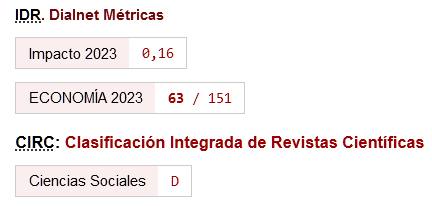El paro productivo: la crisis como producción de desempleo para la reactivación de la rentabilidad empresarial
Palabras clave:
desempleo, precariedad, crisis, activación, intensificación del trabajoResumen
Partimos de la evidencia de que la producción y la gestión del desempleo en España desde el año 2007 ha sido utilizada como un dispositivo de recuperación de las ganancias del capital: los datos actuales muestran que la reactivación de la economía no ha supuesto tanto la generación de empleo, sino que la destrucción de empleo ha sido la vía para incrementar las tasas de rentabilidad empresariales. En nuestra hipótesis, sostenemos que las políticas de gestión del desempleo no han dado como resultado el acceso al empleo de los desocupados sino la intensificación del trabajo de los ocupados. En este artículo analizamos los mecanismos mediante los cuales se ha operado este proceso. Indagamos, en primer lugar, en las bases jurídicas y políticas que hacen del paro estructural un factor productivo y un dispositivo de modulación de las crisis, tomando como analizador central el concepto keynesiano de paro involuntario. En segundo lugar analizamos dos tipos de evidencias: 1) la "desregulación regulada" del desempleo en los principales planes y medidas legislativas promulgadas en los últimos diez años y 2) la interpretación del desempleo como voluntario en el discurso empresarial
Descargas
Citas
Alaluf, Mateo y Martínez, Esteban (1999): ″Bélgica: el empleo desestabilizado por el desempleo. Empleo precario y desempleo activo″ en Carlos Prieto (ed.). La crisis del empleo en Europa. (Vol. 1), Valencia: Germania, pp. 37-64.
Banco de España (2014): Boletín económico. Un análisis de los efectos composición sobre la evolución de los salarios. Disponible en: http://www.bde.es/f/webbde/SES/Secciones/Publicaciones/InformesBoletinesRevistas/BoletinEconomico/14/Feb/Fich/be1402-art5.pdf
Berlin, Isaiah (1958): Cuatro ensayos sobre la libertad, Madrid: Alianza, 1988
Bilbao, Andrés (1993): Obreros y ciudadanos. La desestructuración de la clase obrera, Madrid: Trotta.
Castel, Robert (1997): Las metamorfosis de la cuestión social: una crónica del salariado, Barcelona: Paidós.
Crespo, Eduardo, Revilla, Juan Carlos y Serrano, Amparo (2009): ″Del gobierno del trabajo al gobierno de las voluntades: el caso de la activación.″ Psicoperspectivas, Nº VIII (2), pp. 82-101.
https://doi.org/10.5027/psicoperspectivas-Vol8-Issue2-fulltext-68
CEC (2013): ″España emprende y exporta. ¿Dónde estamos y hacia dónde vamos?″ Disponible en: http://www.ceoe.es/resources/image/Presentacion_Road_Show_CCAA_CEOE_10oct.pdf
Fundación Primero de Mayo (2012): ″52 reformas laborales desde la aprobación del Estatuto de los trabajadores en 1980″, Revista de la Fundación Primero de Mayo, Nº 19, Febrero.
Hill, Ian (2014): "The Rhetorical Transformation of the Masses from Malthus's ″Redundant Population″ into Marx's ″Industrial Reserve Army″". Advances in the History of Rhetoric, 17: pp. 88-97.
https://doi.org/10.1080/15362426.2014.886933
Hirschman, Albert (1978): Las pasiones y los intereses: argumentos políticos en favor del capitalismo antes de su triunfo, México: Fondo de Cultura Económica.
Ibáñez Rojo, Rafael y López Calle, Pablo (2012): "La ficción del milagro económico español a la luz de la crisis financiera", Cuadernos de Relaciones Laborales, Vol. 30 (2), pp. 379-407.
https://doi.org/10.5209/rev_CRLA.2012.v30.n2.40206
Jameson, Fredric (2012): Representing Capital. El desempleo: una lectura de El Capital, Madrid: Lengua de Trapo.
Keynes, John Maynard (1936): Teoría general de la ocupación, el interés y el dinero, México: Fondo de Cultura Económica, 2003.
López Calle, Pablo e Ibáñez Rojo, Rafael (2012): ″Financiarización y relación salarial: estrategias de rentabilidad y conflictos de clase en la semiperiferia del sistema-mundo″ en Luis Enrique Alonso Benito y Carlos Jesús Fernández Rodríguez (eds.) La financiarización de las relaciones salariales: una perspectiva internacional, Madrid: La Catarata, pp. 186-211.
Marx, Karl (1872): El Capital. Crítica de la economía política. Vol. I, Madrid: Siglo XXI, 1979.
Nun, José (1969): "La teoría de la masa marginal", en José Nun, (2001): Marginalidad y exclusión social, Buenos Aires: FCE, pp. 35-140.
Postone, Moishe (2012): ″Thinking the global crisis″, The South Atlantic Quarterly Nº 111 (2), pp. 227-249.
https://doi.org/10.1215/00382876-1548194
Rosell, Joan (2013): ″Entrevista en Radio Nacional de España″, 17 de diciembre de 2013. Audio disponible en: http://mvod.lvlt.rtve.es/resources/TE_S24HOR/mp3/8/0/1387403110308.mp3
Salais, Robert, Baverez, Nicolas y Reynaud, Bénédicte (1986): La invención del paro en Francia: historia y transformaciones desde 1890 hasta 1980, Madrid: Ministerio de Trabajo y Seguridad Social, 1990.
Serrano, A. (2005): ″Del desempleo como riesgo al desempleo como trampa: ¿Qué distribución de las responsabilidades plantea el paradigma de la activación propuesto por las instituciones europeas?″, Cuadernos de Relaciones laborales, Nº 23 (2), pp. 219-246.
Serrano, A., Fernández, C. y Artiaga, A. (2012). ″Ingenierías de la subjetividad: el caso de la orientación para el empleo″, Revista Española de Investigaciones Sociológicas, Nº 138, pp. 41-72.
Vosko, Leah (2010): Managing the margins. Gender, Citizenship and the International Regulation of Precarious Employment, New York: Oxford University Press.
Descargas
Publicado
Cómo citar
Número
Sección
Licencia
Esta licencia permite a terceros compartir (copiar y redistribuir el material en cualquier medio o formato) y adaptar (remezclar, transformar y crear a partir del material para cualquier finalidad, incluso comercial), siempre que se reconozca la autoría y la primera publicación en esta revista (La Revista, DOI de la obra), se proporcione un enlace a la licencia y se indique si se han realizado cambios en la obra.







